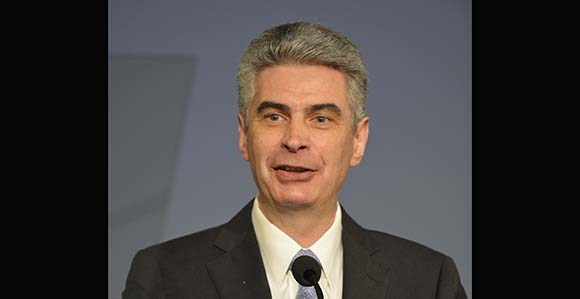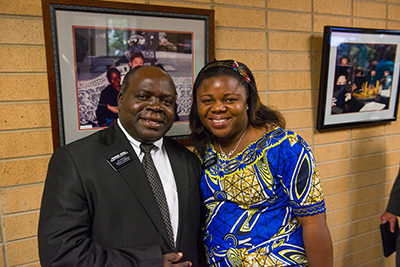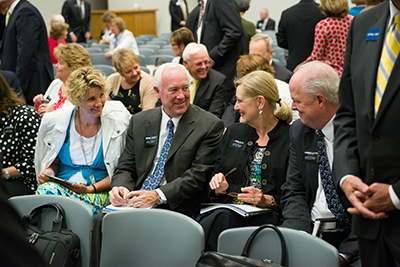Bishop Caussé: Help Missionaries Elevate Personal Consecration
Contributed By R. Scott Lloyd, Church News staff writer

Bishop Gérald Caussé, First Counselor in the Presiding Bishopric, speaks to couples preparing to lead missions during the 2014 Seminar for New Mission Presidents at the Provo MTC.
Article Highlights
- The capacity of missionaries to call upon the powers of heaven will depend upon their level of personal consecration.
“The law of consecration requires that we too dedicate ourselves to the Lord’s sacred work—that we willingly give our time, talents, strength, and all that we possess toward building the kingdom of God on the earth.” —Bishop Gérald Caussé of the Presiding Bishopric
Related Links
PROVO, UTAH
Like the rich young man who asked Jesus what he should do to inherit eternal life and was told to sell all he had to give to the poor and to follow Jesus, “any disciple of Christ can well ponder the questions ‘Am I obedient and faithful enough? Am I lacking anything?’” Bishop Gérald Caussé said in his address at the 2014 Seminar for New Mission Presidents.
Bishop Caussé, First Counselor in the Presiding Bishopric, spoke during a June 24 session of the seminar.
“Our belonging to the Church requires more from us than simply being obedient and faithful members,” remarked Bishop Caussé. “We must be ready to submit ourselves to even higher laws that will prepare us for exaltation.”
Bishop Caussé recounted the occasion when President Thomas S. Monson called him to serve in the First Quorum of the Seventy.
“I am not very proud to admit that one of the first thoughts that crossed my mind at that crucial moment was about a rather secondary aspect of my life,” he said. A pianist since childhood, he had just purchased a new grand piano and wondered what he would do if he were not allowed to take it with him.
“The law of sacrifice requires the willingness to give up the things of the world—even the most precious things if necessary—for the sake of the gospel,” he declared. “We do it with unwavering faith and confidence that these things will be returned to us a hundred fold in the eternities.”
Regarding the Savior’s invitation to “come” and to “follow” Him, Bishop Caussé said the action of coming entails the principle of sacrifice, while the action of following “requires us to live the principle of consecration.“
“In fact, following the Savior implies that we are walking behind Him, placing our footsteps in His,” commented Bishop Caussé.
“The law of consecration requires that we too dedicate ourselves to the Lord’s sacred work—that we willingly give our time, talents, strength, and all that we possess toward building the kingdom of God on the earth.

New mission presidents at the seminar. Photo by Welden Andersen.

Attendees at the 2014 Seminar for New Mission Presidents. Photo by Welden Andersen.
“Moreover, consecration requires us to submit our own will to the Lord, which includes our desires and aspirations.”
He invited the mission presidents and their wives to make the principles of sacrifice and consecration a focal point of their ministry during their entire mission, “not only for you, but also and especially for all of your missionaries.”
The capacity of missionaries to call upon the powers of heaven will depend upon their level of personal consecration, said Bishop Caussé.
He told of a friend who served as a mission president in Africa some 20 years ago, having been assigned to rebuild the mission after a period of evacuation.
One day, he and his wife found themselves trapped in the middle of a military coup. They and eight of their missionaries took refuge in a villa located in the city center.
Leaving to seek food and water, they were captured and taken to the headquarters of rebel forces, where they were questioned in a threatening manner.
“In spite of the brutality of the situation, I felt a power grow inside of me that enabled me to speak with a firm voice, without being aggressive,” related the mission president.
Told by someone that the captors said they were going to kill the president and all of the missionaries, the mission president felt the Holy Ghost come over him with overwhelming power.
“Even [the rebel leader] must have felt it, because his physical appearance suddenly changed, and completely unexpectedly, he asked me, ‘Do you have a Bible?’” the mission president related. “I replied, ‘Yes, of course.’ Then he asked me to read Psalm 91 from the book of Psalms.”
That psalm speaks about the protection the righteous receive from the Lord, Bishop Caussé noted. “At that point, the rebel leader excused himself for his bad behavior. He set down his machine gun and ordered food to be brought to the missionaries. About 45 minutes later, French soldiers arrived with two armored vehicles to evacuate the president, his wife, and the other missionaries.”
Bishop Caussé commented that the story demonstrates a principle that applies to all missions: “Total consecration to the Lord will enable you and your missionaries to call down the powers of heaven. Therefore, one of your priorities as a mission president will be to work unceasingly to help your missionaries elevate their level of personal consecration.”
